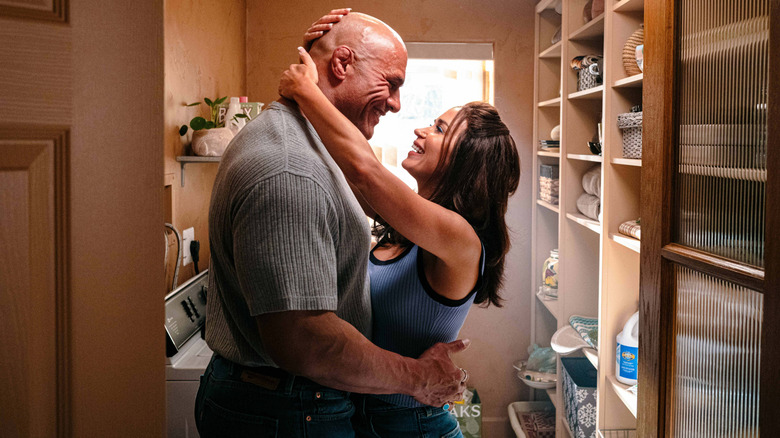RATING : 5 / 10
- Emily Blunt and the makeup are great
- Intriguing in the meta context of Dwayne Johnson’s career
- Emotionally uninvolving, despite some intense subject matter
- Gets extremely repetitive
You’ve never seen Dwayne Johnson lose a fight in a movie. Studios are contractually bound to keep his characters invincible, a revealing factoid indicative of Johnson’s priorities in his movie star career. He hasn’t played a character other than idealized versions of himself in quite some time — can you actually name his “characters” in “Jumanji” or “Jungle Cruise,” or do you just call them “Dwayne Johnson”? His greatest skill hasn’t been acting, but brand management. Recently, however, his once-unbeatable brand has faltered, and to save that brand, he’s now doing something he hasn’t had to in ages: act.
Johnson’s performance as MMA fighter Mark Kerr in Benny Safdie’s “The Smashing Machine” is our glimpse of his Oscar-seeking era. The role isn’t some mind-blowing stretch of his skills. A brutal fighter in the ring, a gentle giant in public, and a self-absorbed mess at home? That’s at least 2/3rds just a different version of The Rock. It does, however, require Johnson to play this persona seriously and with some humility. The film’s most effectively dramatized character arc for Kerr is the story of someone addicted to the thrill of winning learning how to lose with grace. Is Kerr pleading to turn his first big loss into a “no contest” ruling the equivalent of Johnson trying to argue “Black Adam” wasn’t actually a flop?
The meta-narrative of where “The Smashing Machine” fits into Johnson’s career is more interesting than the film itself, which I found a bit of a bore. Johnson’s performance is good enough, and Emily Blunt is truly transformative as Kerr’s unstable wife Dawn Staples, but neither get that much to do beyond repeat the same sort of fights (physical or verbal) over the course of two hours in a film that fails to justify why we should be so interested.
What does this offer that the documentary doesn’t?
“The Smashing Machine” is based on the 2002 HBO documentary about Mark Kerr’s life, titled “The Smashing Machine: The Life and Times of Extreme Fighter Mark Kerr.” I haven’t seen the documentary, but I get the sense that Benny Safdie has followed it very closely. You could copy the doc’s Wikipedia summary into the page for the new movie with few changes, and Maceo Bishop’s cinematography goes for fly-on-the-wall documentary realism. The sound design is also realistic, with scenes often soundtracked to TVs or radios playing in the next room over — when it’s not turning the mood over to surrealism with Nala Sinephro’s electro-jazz score.
Watching one bloody MMA fight set to discordantly calm music is stylish and intriguing. Watching a bunch of them with little variation — and little development of any drama between the competitors — is tiring. The same feeling of repetition also applies to watching Mark and Dawn get in arguments where they call out each other’s selfishness and one or both of them ends up smashing something, though Emily Blunt is by far Dwayne Johnson’s most emotionally compelling sparring partner and their last big fight is the one moment that had the audience at the Toronto International Film Festival collectively gasp in shock. It’s a scene that could only be discussed rather than shown in the documentary, and maybe that’s the justification for this dramatization beyond “The Rock wants an Oscar.”
But it’s also a scene where the follow-through is relegated to a couple closing titles before the credits. Why weren’t the events described in titles the actual ending to the film? That would have given it an interesting arc as opposed to just feeling like a collection of scenes. I’m not inherently opposed to a “collection of scenes” approach to biopics — Agnieszka Holland’s “Franz,” also playing at TIFF, is so loose with narrative that its playfulness cancels out any issues with its aimlessness — but I’m not sure why one would choose to tell this particular story in a way that undercuts its potential dramatic intensity. It’s especially surprising coming from one of the Safdie brothers, whose previous films like “Good Time” and “Uncut Gems” were first and foremost driven by extreme dramatic intensity.
The drama is strangely unmoving
I’m not a fighting sports fan, but I do enjoy a good fighting sports movie. A24’s first foray into the genre, 2023’s “The Iron Claw,” was the sort of movie impossible to finish with dry eyes. “The Smashing Machine” is no “Iron Claw” when it comes to emotion, despite touching on dark themes of opiate addiction and self-harm. Part of its blandness might come down to Kerr himself as a character; he’s neither likable enough to inherently root for nor unlikable enough to be an interesting “Raging Bull”-style antihero. Mostly, I blame the script, which jumps through four years of Kerr’s life in broad strokes and fails to make its disparate scenes come together into a compelling story.
I should take a moment to single out makeup artist Kazu Hiro as one of the film’s MVPs. The two-time Oscar winner and five-time nominee has transformed Gary Oldman into Winston Churchill, Bradley Cooper into Leonard Bernstein, and Eddie Murphy into a fat woman and a Chinese man (it’s Hiro’s fault we can say the phrase “the Oscar-nominated ‘Norbit'”). Here, he makes Dwayne Johnson nearly unrecognizable. In the early scenes, you wonder how much is just the shock of seeing him with hair, but Mark shaves his head midway through and he still doesn’t look like The Rock. It’s not just the different nose; even the shapes of his wrinkles seem different.
Hiro will definitely get another Oscar nomination for his work here. I’d be happy seeing Emily Blunt nominated, confused but vaguely understanding if Johnson makes it in, and shocked if “The Smashing Machine” has any awards future in other categories. Oscar-bait too close to the sun and your wings melt.
“The Smashing Machine” screened at the 2025 Toronto International Film Festival. It opens in theaters on October 3.
If you or anyone you know needs help with addiction issues or are in crisis, contact the relevant resources below:
-
The Substance Abuse and Mental Health Services Administration website or contact SAMHSA’s National Helpline at 1-800-662-HELP (4357).
-
Call or text 988 or chat 988lifeline.org

![Dwayne Johnson’s Serious A24 Movie Feels Half-Baked [TIFF 2025]](https://bengaluruchronicle.com/wp-content/uploads/2025/09/l-intro-1757533617-1024x576.jpg)

